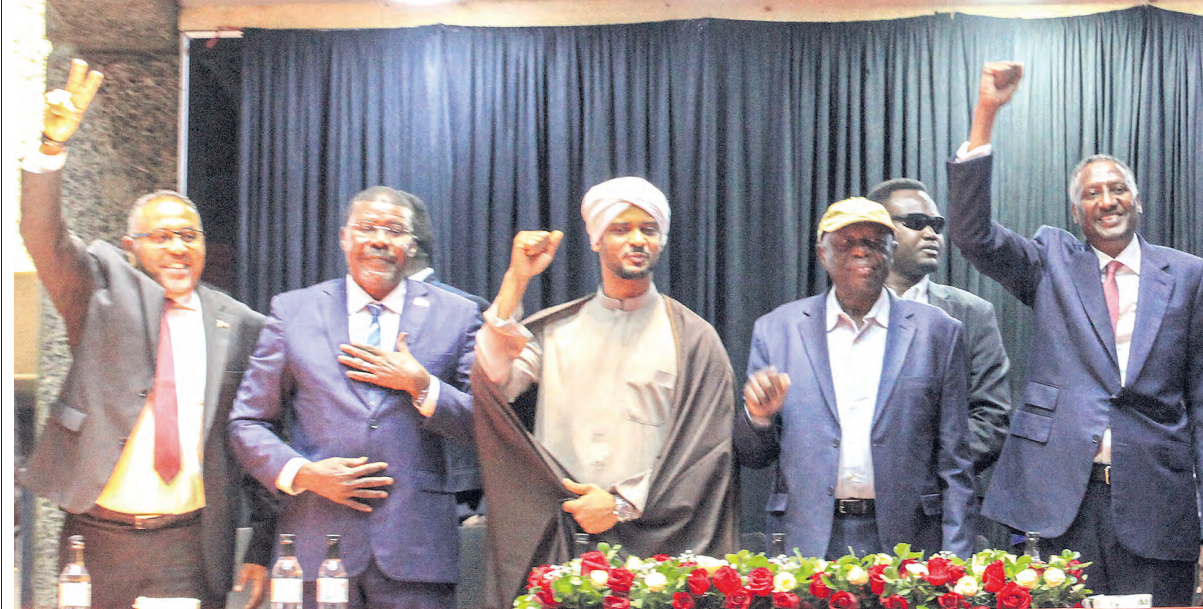
President William Ruto is yet again entangled in another regional conflict after allowing a sanctioned Sudanese militia to hold a meeting in Nairobi to launch a parallel government in Khartoum.
The Rapid Support Forces, one of the warring factions accused of genocide in the protracted Sudan war, met at KICC on Tuesday to plan for the launch of what it termed as a “Government of Peace and Unity”.
The move will likely trigger a fresh diplomatic row with the Port Sudan-based military regime, coming at a time Kenya is already in the spotlight over her ties with neighbouring countries.
The government, however, insists Kenya is not supporting RFS. Foreign Affairs Principal Secretary Korir Sing’oei told the Star that “quite to the contrary, Kenya is a supporter of a negotiated settlement to the dispute and has said as much time without number.
“That one side to the conflict are laying down her political demands in no way suggests that the government favours these demands.”
However, the launch of the RFS charter in Nairobi will see Port Sudan protesting and reversing attempts to thaw diplomatic relations with Nairobi.
International lawyer Owiso Owiso said all illusions of Kenya being a neutral mediator were shed a long time ago and “certainly stopped pretending about that. “If RSF were to ‘launch’ a parallel government in/from Nairobi, that would be a serious violation by Kenya of the principle of non-interference in the internal affairs of another sovereign state (Article 4g, AU Constitutive Act),” Owiso said.
He further argued that as RSF is dedicated to regime change by use of force, Kenya would technically be aiding and abetting this, contrary to obligations to respect the territorial integrity of Sudan, according to Article 2.4 of the UN Charter.
“We also must recall that RSF stands accused of serious violations of international humanitarian law and gross violations of human rights amounting to international crimes. By hosting them here, Kenya is potentially violating its obligations under international law treaties like the Torture Convention,” he added.
On Tuesday, RSF and other groups drawn from political parties, civil society, youth and social groups gathered at the KICC in Nairobi — adjacent to the Ministry of Foreign Affairs headquarters — where they said they would be launching a parallel administration known as the “Government of Peace and Unity.”
The event, which was postponed from Monday, will proceed for two days, after which the signing of the Charter for the Government of Peace and Unity will be signed with “broad popular participation and a large diplomatic and international presence” on Wednesday.
Among the high-profile attendees were US-sanctioned RSF deputy commander Abdulrahim Hamdan Dagalo.
Hamdan is brother to RSF commander Lt Gen Mohamed Hamdan Dagalo, who is fighting against the Sudan Armed Forces led by Gen Abdel Fattah al Burhan, the leader of Sudan.
The conflict in Sudan has killed tens of thousands of people and driven millions from their homes. Ruto’s close association with RFS is baffling.
The group, including its leader Dagalo, is sanctioned by the US and barred from travelling to America. Any of their assets in the US have also been frozen.
Financial institutions and others that engage in certain activities with him also risk being hit with sanctions. Interestingly, Kenya is a close US ally and has been designated a non-NATO ally.
Sources at the KICC meeting said the RSF leader Dagalo arrived in Nairobi on Sunday for the unveiling of the “Government of Peace and Unity”.
A delegate from Khartoum attending the meeting told the Star that RSF and the allied parties are seeking to form an administration to govern the states they control, which he noted were 11, including the capital.
“This charter aims to restore the legitimate government that was overthrown by the remnants of and militias of the Islamic Movement and reinstate the democratic path through a national consensus that includes all the political, civil and social forces, laying the foundation of a new phase of stability and sustainable peace,” the invite said.
The move to host the event launching the parallel government came a day after Sudan and Iran Foreign ministers met in Tehran over “developments in the region”.
Following the meeting on Monday evening, Iranian Foreign Affairs Minister Seyed Abbas Araghchi stressed the importance of preserving Sudan’s national sovereignty and territorial integrity, ending foreign interference in its affairs, and creating the conditions necessary to resolve the conflicts and achieve national consensus.
The Sudan conflict has already been internationalised with the UAE, which has had years of animosity on different sides of geo-political rivalries with Iran, being accused of supporting RSF.
Further escalation of the conflict risks drawing more involvement of external players. Sudan’s Al-Sharif said he appreciates Iran’s support of Sudan in preserving the territorial integrity and national sovereignty of the country”.
The RSF meeting in Nairobi comes just two days after Kenya’s candidate for the African Union Commission chairmanship Raila Odinga lost the election.
Kenya’s conduct regionally and internationally has been widely cited among the reasons for the defeat by Djibouti, a small country with a population of about one million people.
Djibouti has a GDP of about $3.515 billion — a drop in the ocean compared Kenya, a regional powerhouse with a GDP of $113.4 billion.
Ahead of DRC elections in December 2023, Nairobi allowed DRC rebels to launch what the group termed a political-millitary alliance in Kenya. This triggered a major diplomatic row with Kinshasa. President Felix Tshisekedi swiftly recalled his envoys from Kenya and Tanzania, which hosts the EAC headquarters.
DR Congo also barred East African Community observers from
entering the country to monitor the
elections.
There are speculations that Kenya’s handling of the DRC crisis,
which has sucked in Southern African countries, could be among the
issues that cost Raila the AU top job
on Saturday.








